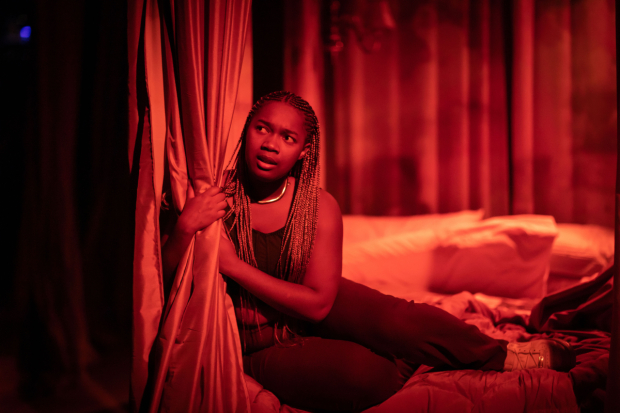
© Helen Maybanks
There's no doubt that Jasmine Lee-Jones is a great talent. Her debut play seven methods of killing kylie jenner blazed from the stage; it wasn't perfect, but it was quite the best thing in 2019, the year it swept up all the playwriting awards. It announced a distinctive voice, full of poetry, but also of the language and concerns of contemporary Black women.
This semi-autobiographical monologue confirms that sense of discovery. Lee-Jones herself takes to the stage as Jaz, a trainee actress, who is rehearsing a Restoration drama. It's not going well. The two Black actors on the acting course are confined to playing Servant 1 and Servant 2 – originally one part, but now divided between them. Oh, and she also gets to play a footstool for a white student called Rosebud to rest her feet on. "It's a solid can't relate on so many levels," she moans. "Because these plays weren't written with people like me in mind."
This realisation sets her off on a journey of discovery, to try to find Black faces in the English theatre before Ira Aldridge in the 18th century, to carve a sense of black presence on the British stage. En route, she introduces us to a former slave called Celia Edlyne, who made her name as an actress, but also to her best friend, Mon, to an attractive male curator at the Black Cultural Archives, and to the South London gay scene which incorporates a queer rave in a field in Croydon – "the deep South Kentucky-like."
Her adventures are funny as well as serious, moving, closely-observed, and ultimately deeply surprising. They are held together by Lee-Jones' vigorous, vivid language, which she wields with grace and control. She's a wonderful presence on stage too, moving effortlessly between ten roles, bringing them to life in front of our eyes.
Director Anna Himali-Howard provides a deliberately knowing production, where hands appear from behind a curtain to furnish Lee-Jones with the necessary props. Camilla Clarke and Rosie Elnile have conjured a simple yet effective set, dominated by a silk-canopied four-poster bed where Celia's story comes to life.
That thread of thought, about what British history ignores, about the Black faces who lurk in the background of 17th century etchings and round the margins of Restoration plays, is beautifully tied into the way that Jaz has to learn to see more than she first perceives in the people around her. The play also raises troubling and intractable questions about the way that Jaz, and Black women in general, are forced to play roles in order to be seen.
The reach and ambition of its thinking means that the play has some structural difficulties; in rushing to the end of its stories in its allotted 90 minutes, it doesn't quite allow them to breathe. But the intelligence and challenge of the writing and the engagement of the performance confirm that sense that Lee-Jones is both a breath of fresh air – and someone you will always want to watch.












